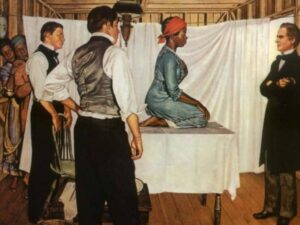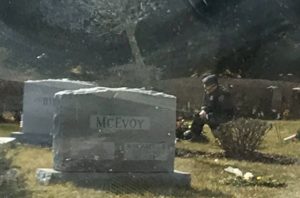On May Day, Princess Nokia’s song “Brown Girl Blues” echoed throughout Mission Plaza, her spoken-word-like lyrics filling the plaza with graphic imagery of the adversary and abuse people of color experience in the United States.
“You think it’s been a long time since Civil Rights?” the lyrics read. “No, still our people have to go out and fight.”
About 50 people gathered in front of the steps of Mission San Luis Obispo de Tolosa on Saturday, May 1, where speakers acknowledged the genocide of Indigenous people in that very spot centuries before.
May Day is an annual celebration of worker’s rights that originated from the 19th century labor movement that advocated for policies such as the eight hour work day in the United States.
The May Day rally hosted by Abolitionist Action Central Coast/SLO (AACCS) was planned to acknowledge these labor movements while also reaffirming the group’s solidarity with feminist, anti-colonial and people’s movements worldwide.
Carmen Bouquin, member of AACCS, said their goal was to disrupt the downtown environment not as a “direct action,” but to “signal that we’re still here.”
The rally focused on anti-capitalist ideas, with multiple speakers explaining how a capitalist system exploits laborers.
“Why is it only a select few who can afford these things that help us survive and make them richer?” a speaker who identified themself as Ariel asked. “Why will they also pay us as little as possible so they can make as much as possible?”
Many speakers called for the end of a capitalist economy, suggesting a community-based economy alternative that centralizes communities in the economy, not capitalism.
“We will continue to resist,” Ariel said.
Chuy Caracoles, a member of Central Coast activist group SBSLO Alliance, shared the story of the Zapatistas of Southern Mexico.
The Zapatistas is a group of mostly rural Indigenous people that hold territory in the Southern Mexico state of Chiapas. By fighting neoliberal policies — such as deregulation and the reduction of state spending — and returning control of local resources to Indigenous people, Bouquin says the group has reworked the way people view labor.
Caracoles cited an excerpt from a Zapatista manifesto, which read, “We are going to seek, and to find, those who love these lands and these skies even as much as we do. … We are going for democracy, liberty and justice for those of us who have been denied it.”
A group of Chumash women from Ventura spoke about the genocide and abuse of Indigenous people through the mission system, as well as the continued hardships that Indigenous people face in regards to their sovereignty.
“We’re not asking for everything,” a Chumash woman who identified herself as Marianne said. “We’re just asking for something.”
With disproportionately high rates of rape, suicide, lack of permanent housing and more hardships still facing Chumash women, Marianne said there’s an estimated 200 years more to go before achieving the peace Indigenous people still fight for today.
At the conclusion of her speech, a leader shouted “who’s land” which the crowd responded with “Chumash land.”
The complex issues encompassed by May Day also translate directly to the California State University (CSU) system, as explained by Cal Poly history professor Lewis Call.
Call, who is union president of the California Faculty Association San Luis Obispo chapter, said CSUs, especially Cal Poly, are increasingly becoming privatized despite being intended as a “people’s university.”
Call said state funding has decreased as CSUs rely more on student fees — while the number of enrolled working class students and students of color increases.
Meanwhile, Call said, CSU Chancellor Joseph Castro’s salary rests at $625,000 a year and Cal Poly President Jeffrey Armstrong’s at $450,000 a year.
“Take back the people’s university — take back Cal Poly,” Bouquin said.
Bouquin, who herself works as a farm laborer in Santa Margarita, also emphasized the issue of the exploitation of farmworkers on the Central Coast.
“We want to spread awareness for the farmworkers in our area, especially since the city of San Luis Obispo is so unaware of what’s going on in the surrounding cities,” Bouquin said. “We are trying to spread advocacy for the fact that farm workers are underpaid and completely forgotten, and then also completely working our economy here.”
Speakers called on people to educate those around them, support local businesses, unionize, organize their own tenant buildings, support public education and more. Though Bouquin says the alternative is unknown, the group pushed for continuous collective action to create cooperative systems beyond capitalism.
Business administration senior Kaela Lee said they attended the May Day rally to show support in numbers and allow for people’s voices to be heard. Still, they said “the people that need to be listening” weren’t there.
“I feel like the frustrating part is the people who should be listening don’t come,” Lee said. “The people who already know about what’s being said and are actually educated on this topic are the ones that show up every time.”
Caracoles, on behalf of SBSLO Alliance, invited white people especially to show up and take action.
“Don’t leave it up to BIPOC — Black, Indigenous, people of color — to fight these battles that your ancestors started,” Caracoles said.




